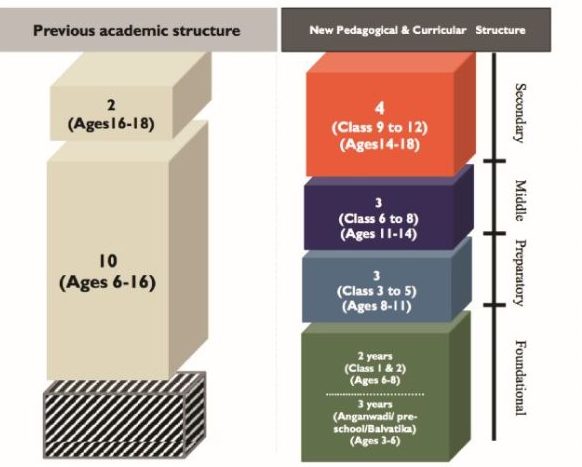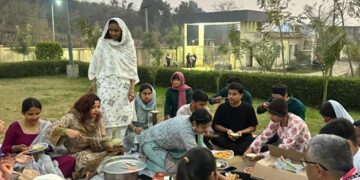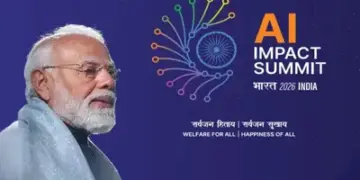By: Nisar Hussain Hajam
Albert Einstein ones remarked “EDUCATION is what remains after one has forgotten what one has learnt in school.”Education has been an essential field that has been priority of all the developed as well as developing nations all over the world. When we look back, India has also the long past history of Education and there have been several reforms and commissions that were taken in this sector to take it to new heights.
From Macaulay to Woods Despatch to several commissions like Sadler Commission 1904, Indian Education Policy etc build the foundation of the education system during the colonial period. In 1948-49 The University Grants Commission was constituted under Dr. S. Radhakrishnan. Then in 1964, Kothari Commission came into being which provided the basic framework of education like 10+2+3 pattern, equalization of opportunities to all, job training of the teaching staff and for efforts to raise the status of the teachers to attract talents into the profession.
After Kothari Commission NEP 1968 provided for radical restructuring and equalization of educational opportunities to achieve national integration and greater cultural economic development. Three language formula was also encouraged. Then it was National Educational Policy 1986 which aimed at the removal of disparities, launching of operation blackboard, IGNOU, the Open University. It also recommended for a shift in the focus of evaluation from certification to improvement in learning. It also introduced grades in place of marks and semester system from secondary stage in a phased manner.
The RTE Act 2009 which provides expanding the ambit of the act to all children between the ages of 3 to 8 years, thus including ECE and Secondary education along with no detention policy till class 8th.In addition several educational reforms also got introduced.
Recently Government of India implemented the National Educational Policy 2020 throughout the country and UT of J&K is no exception.
NEP 2020 has been well appreciated for its comprehensiveness and inclusivity. And is also the first educational policy that advocates bringing pre-school into the ambit of formal institutionally managed education system.
Here are the key points that makes NEP 2020 a special and unique one.
1.It ensures Universal Access to all courses from Pre-Primary to Grade 12.
2.It advocates quality Early Childhood Care and Education (ECCE)
3.Old 10+2 structure is replaced by a new curricular pedagogical structure 5+3+3+4 model which is in tune with the ages 3-8, 8-11, 11-14 and 14-18 years. First 5 years includes Pre-Primary classes and Grades 1&2 (Foundational stage) and the method of teaching is only Play way method. The next 3 years stage is Preparatory stage which include grades 3 to 5. Then next 3 year stage includes grades 6 to 8 as middle stage. Last 4 years covers secondary school period i.e. grades 9 & 10 and senior secondary 11 and 12. Here the most important change has been done and that is no restriction on choosing the subjects in grade 11 thereby marks the end of streams like arts, science, commerce etc. During this period focus has been put on critical thinking rather on memorization.
One more important and necessary change has been done in graduation course and the restrictions like completion of course and awarding of degree only after passing all the three years of graduation along with choice of subjects have also been abolished. Here the students will get the benefit of each and every passing year. After passing the first year certificate course, after passing 2nd year diploma, 3rd year degree and after passing 4th year Graduation Research will be awarded to the student.
4.Holistic and multi-disciplinary education with multiple entry/exit options: After 12th if a student after completing one year of a course want to choose different course, then the credits of that one year are added to the new one, thereby preventing any probable academic loss of the student.
5.Proficiency in language and communication skills has been encouraged.
6.NIPUN Bharat mission(National Initiative for Proficiency in Reading with understanding and Numeracy). It is one of the initiatives taken by Ministry of Education under NPE 2020 in July 2021. Its aim is to attain proficiency in reading with understanding and numeracy skills up to the age of 9 yrs. i.e. up to class 3rd by 2026-2027. It covers the age group of 3-9 years.
7.FLN(Foundational Literacy and Numeracy)
The main aim of FLN programme is to enable all children to read and respond with comprehension, independently write with understanding, develop number sense, mathematical thinking, problem solving and reasoning. FLN has three developmental goals
I.HW(children maintain good health and well-being)
- EC (children become effective communicators)
iii. IL (children become involved learners)
8.Emphasis on promoting multilingualism, but medium of instruction until at least grade 5 be mother tongue preferably till grade 8
9.Setting up of regular formative assessment, target Learning Outcomes and competencies
10.PARAKH(Performance Assessment Review and Analysis of Knowledge for Holistic Development)
11.Introduction of School Based Assessment: It focuses on competency development rather than content memorization and is wholly child centred. Moreover, this type of assessment strategy is stress free and enhances interaction as well as participation.
12.Equitable and inclusive education-special emphasis on socially and economically disadvantaged groups(SEDG)
12.Professional education is an integral part of the higher education system which makes Education Job oriented.
13.To increase the GER to 100% in preschool to secondary level by 2030
14.Conceptual understanding_ Unique pedagogical approaches for different subjects to learn subject as skill.
Moreover, key competencies of each goal have also been identified. In order to supplement the NPE 2020 with paper less mode, various digital initiatives have been launched such as e-Samiksha Portal, feedback portal, biometric attendance portal, Sparrow portal(Smart Performance Appraisal Report Recording Online Window) and Annual Transfer Portal.
In short NEP 2020 is itself a revolution in the field of education and it’s features guarantee competency based education, experiential learning,job oriented education and abolishment of rote learning, memorization, passive learning and traditional methods.
The writer is a Teacher in Zone Lurgam







